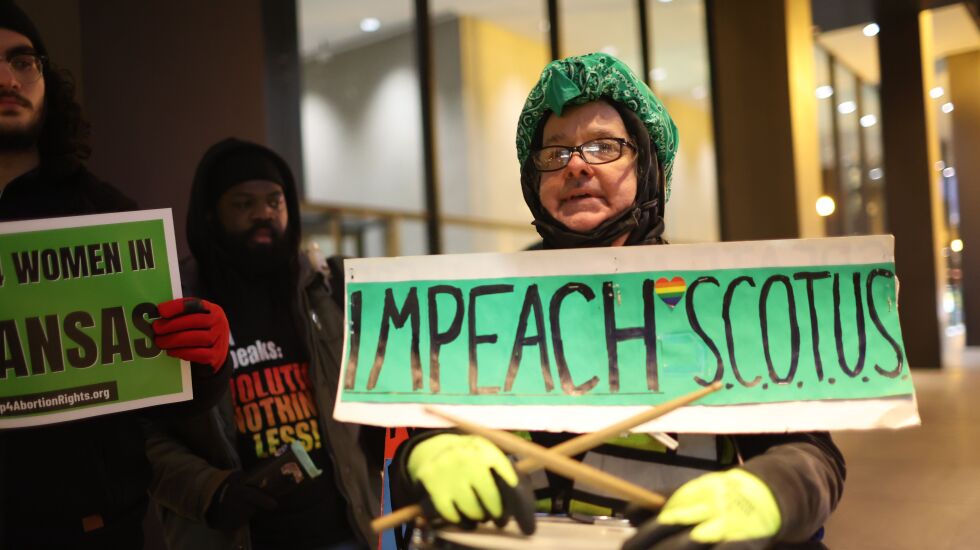
Illinois must continue to be a safe zone for people coming from other states to get abortion services.
Since the U.S. Supreme Court’s Dobbs v. Jackson ruling saying the Constitution does not provide a right to abortion, some other states have started looking into ways to make it harder for women to travel to places where abortion is legal, including Illinois.
Illinois can’t control what other states do, but it can work to protect women once they are here.
Many more women have started traveling to Illinois for abortions or abortion pills, from states such as Missouri, Arkansas, Kentucky and others. An Illinois nonprofit, Elevated Access, is recruiting volunteer pilots who will transport women seeking reproductive care to states where abortion remains legal. So far, at least 13 states have banned most abortions, and others are expected to try to do so. And some politicians in those states are working to find ways to prevent their residents from getting abortions elsewhere.
Illinois should take steps to keep those politicians from encroaching on the rights of people who are in our state, even if they have just traveled here, to access reproductive services.
There has not been a rush to prosecute women who cross state lines to seek an abortion. Yet.
But the Supreme Court’s Dobbs ruling shows how quickly the rules can change. Never say never. There’s the potential for laws that would allow abortion vigilantes to file civil lawsuits against women who cross state lines to get an abortion or abortion pills — and even the health care professionals who provide the care. The conservative Thomas More Society is drafting model legislation states could use to let private citizens to sue anyone who helps a resident go elsewhere to end a pregnancy.
If nothing else, such laws could create a chilling effect. Women might be leery of traveling, and health care professionals might be wary of providing services to women from states where abortion is banned.
Consider the potential case of a woman from a state with a strict abortion ban who comes to Illinois to get an abortion or abortion pill and then has complications upon arriving back home. As stricter anti-abortion laws go on the books, could that person be prosecuted for consulting an out-of-state Illinois doctor about the complications? Would a local doctor be willing to help?
In August, Nevada Gov. Steve Sisolak signed an executive order saying his state would not help other states prosecute women who travel to Nevada for abortions. New York and California have put rules in place to protect abortion providers from out-of-state liability.
Illinois has created a legislative working group that is studying, among related issues, the issue of penalties on abortion patients from other states. We urge that group to take action to protect women when they travel to our state to access reproductive care.
“We are in uncharted legal territory,” said state Rep. Kelly Cassidy, D-Chicago, who leads the working group. “We are focusing this on finding a way that provides real protection.”
Alarming ability to track women’s movements
The days when someone could cross state lines to get an abortion without anyone knowing about it are long over. Officials and abortion vigilantes in other states can use a wide range of technology to track people who come to Illinois for abortions, and they might try to use the data to prosecute or sue women when they get home.
License plate trackers can show police in other states when people drive across their state lines. Private services with access to license plate tracking data can show where they go after that, including a health clinic in Illinois.
So-called geofencing data can show who was at a health care clinic in Illinois. Health apps can show who was pregnant. Internet history, third-party tracking codes on clinic web pages, emails, texts and credit card purchases can all be used to track a person’s movements. Tollway transponder data is shared with some other states. Even services such as ride-hailing create their own tracking history.
Women can do some things to protect themselves, such as leaving their phone at home, using privacy-conscious web browsers, checking privacy settings and turning off ad identifiers on phones. But not everyone has the tech savvy to hide their electronic tracks, and at any rate, they should not have to do so. Cassidy said one option is to make sure data that is collected is erased as soon as possible so it can’t be subpoenaed later.
Some bills before Congress would help, such as the Fourth Amendment Is Not for Sale Act and My Body My Data Act, which would rein in tracking abuses. But Illinois can’t wait for the federal government to act.
Illinois has been a pioneer in privacy protection. Our state can, and should, build on that by protecting women who need abortion care.
The Sun-Times welcomes letters to the editor and op-eds. See our guidelines.







